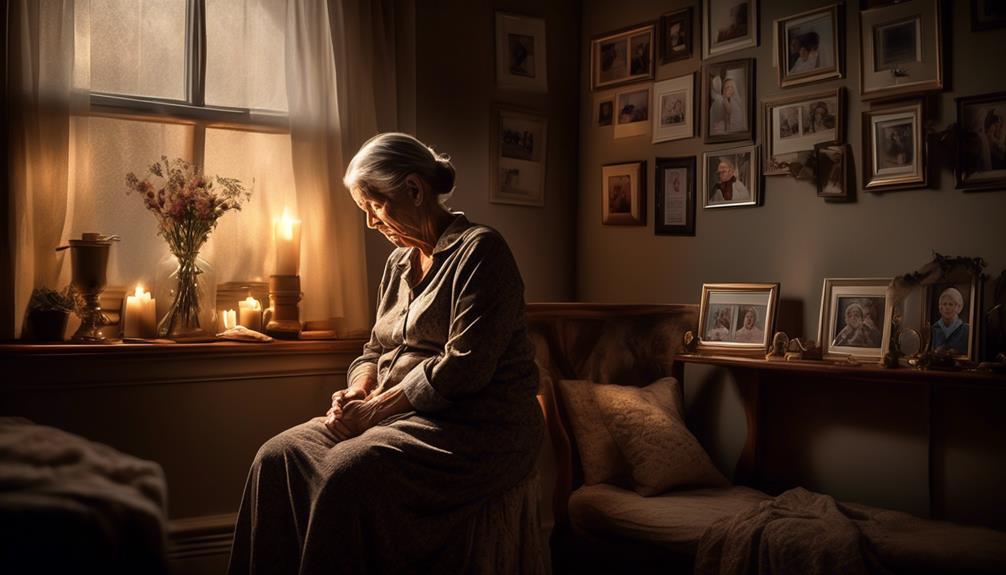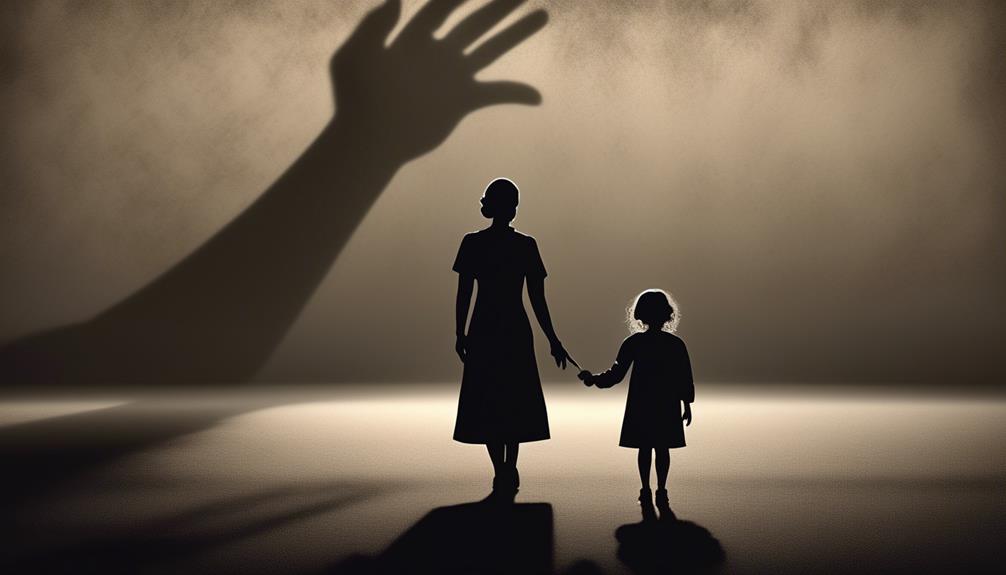A recent survey uncovered a startling statistic: over half of caregivers confess to experiencing guilt in their role. Maneuvering through the caregiving journey is comparable to riding a roller coaster, with moments that push you to reflect deeply and provide true satisfaction.
As we explore the intricate balance between remorse and fulfillment, we uncover valuable insights that shape our understanding of this vital role.
Through shared experiences and the pursuit of peace amidst uncertainty, caregivers embark on a profound journey of self-discovery and compassion.
Key Takeaways
- Self-reflection aids in confronting missed opportunities with compassion.
- Addressing regrets crucial for maintaining caregiver's mental well-being.
- Embracing growth and lessons learned outweigh past caregiver regrets.
- Caregiving journey involves finding peace, growth, and transformative support.
The Burden of Unresolved Regrets
Navigating the weight of unresolved regrets in caregiving can be emotionally taxing, hindering our ability to provide the best support for our loved ones. As family caregivers, we often find ourselves grappling with missed opportunities to show love and support, leading to deep-seated regrets. Instances of impatience, oversight, or neglect can weigh heavily on our hearts, impacting our effectiveness in providing care. The burden of unresolved regrets can cast a shadow over our caregiving journey, clouding our judgment and affecting our emotional well-being.
Addressing these regrets is crucial in maintaining our mental and emotional health during the caregiving process. By acknowledging and working through our remorse, we can prevent it from consuming us and hindering our ability to be present for our loved ones. Despite the weight of past regrets, finding moments of genuine commitment and presence can bring solace and meaning to our role as caregivers. Embracing our vulnerabilities and learning from our mistakes allows us to navigate the complexities of caregiving with compassion and resilience.
Embracing Moments of Small Victories

As we reflect on our caregiving journey, embracing moments of small victories becomes a beacon of light amidst the shadows of regret and uncertainty.
In the realm of End of Life care, caregivers navigate a complex landscape filled with challenges and emotions. Recognizing and celebrating these small achievements can provide us with a sense of fulfillment and purpose, offering a glimpse of hope in the midst of difficulties.
These victories, whether they involve improved communication, a peaceful day, or a shared smile, may seem trivial in the grand scheme of things, but they're the building blocks of a better understanding and connection with our care recipients.
Lessons Learned Through Heartache
In facing the heartache of caregiving, we uncover profound lessons that shape our understanding of love, compassion, and resilience. Caregiver regrets often surface from missed opportunities for quality time with our loved ones. The realization that impatience or oversights have occurred can lead to deep feelings of remorse within us.
However, it's crucial not to let these regrets overshadow the overall caregiving journey. Instead, genuine commitment and being present during pivotal moments can outweigh past regrets. By prioritizing quality time and demonstrating unwavering care, love, and support, we can create lasting positive impacts that overshadow any feelings of regret.
Through the heartache of caregiving, we learn the importance of cherishing moments, showing dedication, and embracing the opportunity to make a difference in the lives of those we care for. Each experience, even those tinged with regret, contributes to our growth and understanding of the profound connection between love and caregiving.
Finding Peace in Self-Reflection

Self-reflection serves as a powerful tool for caregivers to confront and address any regrets they may harbor regarding missed opportunities or past actions. It allows us to delve into moments of impatience or oversights that could have led to feelings of remorse. Through self-reflection, we come to understand that regrets shouldn't define our caregiving journey.
Here are three ways self-reflection aids us in finding peace:
- Acknowledging Growth: Reflecting on our actions helps us recognize areas where we've grown as a caregiver, learning from past mistakes and becoming more attuned to the needs of our family member.
- Focus on Positive Impact: By reflecting on our caregiving journey, we can shift our focus from regrets to the positive impact of our unwavering care, love, and support, realizing the significance of our presence during critical moments.
- Embracing Commitment: Self-reflection enables us to reaffirm our commitment to providing compassionate care, understanding that genuine dedication and involvement in long-term care outweigh any past regrets.
The Transformative Power of Caregiving
Experiencing the transformative power of caregiving reshapes not just our roles but also our entire outlook on life. Caregiving goes beyond providing physical or emotional support; it is a journey of personal growth, community engagement, and self-discovery. Through caregiving, we tap into reservoirs of resilience and empathy we never knew existed, navigating challenges with unwavering determination and compassion. This transformative journey often leads to a profound shift in perspective, allowing us to see the world through a lens of gratitude, humility, and interconnectedness.
| Transformative Power of Caregiving | ||
|---|---|---|
| Personal Growth | Community Resources | Resilience |
| Embracing challenges leads to self-discovery and growth. | Accessing support networks enhances caregiving experience. | Overcoming obstacles fosters inner strength and adaptability. |
Caregiving teaches us to lean on others, seek community resources, and prioritize self-care, ultimately reshaping our identities and relationships. The transformative power of caregiving lies not only in the care we provide but also in the profound ways it shapes our own lives for the better.
Frequently Asked Questions
What Is the Most Difficult Thing in a Caregiver Job?
Balancing personal needs and caregiving responsibilities is tough. Managing guilt and regret over past decisions is emotionally taxing.
The physical and emotional exhaustion of daily care is a major difficulty. Coping with constant worry for a loved one's well-being affects mental health.
Dealing with isolation and lack of support adds to the challenges. Caregivers face a multitude of difficulties that can take a toll on us all.
What Is Caretaker Stress Syndrome?
Caretaker Stress Syndrome is a condition where caregivers experience physical, emotional, and mental exhaustion from long-term care. It can manifest as overwhelming stress, anxiety, and depression, impacting health and relationships.
Factors like lack of support and neglecting self-care contribute to this syndrome. Recognizing its signs is vital to seek help and prevent negative effects on health and caregiving abilities.
Caregivers must prioritize self-care and seek support to manage Caretaker Stress Syndrome effectively.
What Are the Symptoms of Caregiver Burnout?
When we face caregiver burnout, we may experience fatigue, irritability, and a sense of hopelessness.
Physical symptoms like headaches, stomach problems, and changes in weight can signal burnout.
Emotional signs such as mood swings, withdrawal, and loss of interest in activities might appear.
Cognitive challenges like forgetfulness, trouble focusing, and indecisiveness often accompany burnout.
Behavioral shifts towards increased substance use, neglecting duties, and isolation are common indicators of caregiver burnout.
Why Is It so Hard Being a Caregiver?
Being a caregiver is challenging due to the emotional toll, physical demands, and time commitment involved.
It's hard because we juggle caring for others with our own needs, often feeling guilt, regret, and burnout.
Setting boundaries can be tough, and the weight of responsibilities may feel overwhelming.
Balancing self-care with caregiving is a constant struggle, leading to internal conflicts.
Navigating these complexities makes caregiving a tough journey.
Conclusion
In the intricate dance of caregiving, we've waded through a sea of regrets and triumphs, finding solace in the midst of chaos. Our journey has been marked by heartache, but also by profound moments of joy and growth.
Through our unwavering commitment to those in need, we've discovered the transformative power of love and compassion. As we reflect on our experiences, we realize that the rewards of caregiving far outweigh the burdens, leaving us forever changed and enriched.









